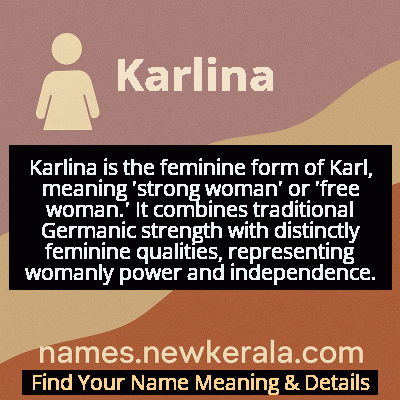Karlina Name Meaning & Details
Origin, Popularity, Numerology Analysis & Name Meaning of Karlina
Discover the origin, meaning, and cultural significance of the name KARLINA. Delve into its historical roots and explore the lasting impact it has had on communities and traditions.
Name
Karlina
Gender
Female
Origin
German
Lucky Number
3
Meaning of the Name - Karlina
Karlina is the feminine form of Karl, meaning 'strong woman' or 'free woman.' It combines traditional Germanic strength with distinctly feminine qualities, representing womanly power and independence.
Karlina - Complete Numerology Analysis
Your Numerology Number
Based on Pythagorean Numerology System
Ruling Planet
Jupiter
Positive Nature
Optimistic, inspirational, and creative.
Negative Traits
Scattered, exaggerating.
Lucky Colours
Yellow, gold, purple.
Lucky Days
Thursday.
Lucky Stones
Yellow sapphire.
Harmony Numbers
1, 2, 9.
Best Suited Professions
Arts, writing, communication.
What People Like About You
Creativity, optimism.
Famous People Named Karlina
Karlina Leksono Supelli
Philosopher and Academic
Prominent Indonesian philosopher and women's rights advocate
Karlina Oktaviany
Environmental Scientist
Leading researcher in sustainable development and climate change
Karlina Verkhoturtseva
Artist
Noted Russian painter known for feminist art movements
Name Variations & International Equivalents
Click on blue names to explore their detailed meanings. Gray names with will be available soon.
Cultural & Historical Significance
Throughout its history, the name has symbolized the evolving concept of feminine strength—not as a mere imitation of masculine qualities, but as a unique combination of resilience, wisdom, and nurturing power that defines womanhood in modern contexts. During the women's movements of the 20th century, names like Karlina gained renewed relevance as they embodied the ideal of women claiming their own strength rather than being defined in relation to men. The name's cultural journey mirrors society's evolving understanding of gender roles, making it a meaningful choice for parents who value both tradition and progress in their naming decisions.
Extended Personality Analysis
Women named Karlina are often perceived as possessing a unique blend of strength and compassion that defines their character. They typically exhibit natural leadership qualities combined with deep emotional intelligence, allowing them to navigate complex social situations with grace and determination. This combination makes Karlinas excellent mediators and community builders who can assert their opinions while maintaining harmonious relationships. Their inherent strength manifests not as aggression but as steadfast reliability—they are the pillars others lean on during difficult times.
Karlinas tend to be practical problem-solvers who approach challenges with both logical analysis and intuitive understanding. They often display remarkable resilience in adversity, bouncing back from setbacks with renewed purpose and wisdom gained from experience. Their feminine strength is complemented by strong nurturing instincts, making them protective of loved ones while encouraging independence in others. Many Karlinas develop a quiet confidence that doesn't need external validation, and they often become mentors or role models in their professional and personal circles. This balance of firmness and gentleness allows them to adapt to various roles throughout life while maintaining their core identity, whether as professionals, partners, parents, or community members.
Modern Usage & Popularity
In contemporary times, Karlina maintains moderate popularity in German-speaking countries and has seen increased usage in international contexts due to globalization. The name appeals to parents seeking traditional roots with a distinctive feminine sound, standing out from more common variations like Karolina or Caroline. While not among the top 100 names in most countries, Karlina enjoys steady usage among families with German heritage or those appreciating its balanced combination of strength and elegance. Recent years have shown a slight resurgence as parents move away from extremely popular names toward more unique yet meaningful choices that honor cultural heritage while feeling fresh and distinctive in multicultural settings.
Symbolic & Spiritual Meanings
Symbolically, Karlina represents the harmonious integration of strength and femininity—a concept that transcends literal meaning to embody the modern woman's multifaceted nature. The name evokes images of ancient oaks (representing endurance and wisdom) combined with the grace of flowing water (symbolizing adaptability and emotional depth). In metaphorical terms, Karlina signifies the bridge between tradition and progress, honoring ancestral roots while embracing contemporary values of gender equality. The name carries connotations of protected freedom—like a fortress that provides security without confinement—suggesting a person who creates safe spaces for growth while encouraging independence in others.

